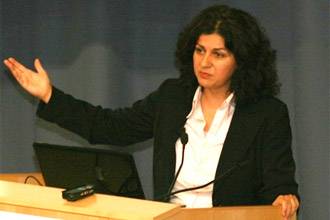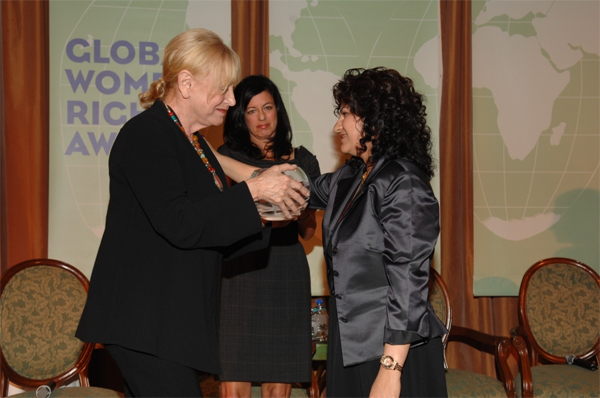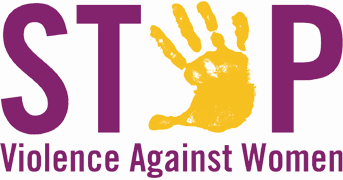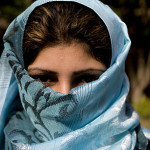Iraqi woman human rights defender Yanar Mohammed spoke to Jennifer Allsopp at the Nobel Women’s Initiative conference about grassroots responses to the atrocities women are facing under ISIS.
On the second day of the Nobel Women’s Initiative conference on building global support for women human rights defenders, the 100 participants delivered a sobering and urgent message: history is still repeating itself. Watching the military-industrial complex wreak havoc in the Middle East, reflected Shirin Ebadi, holder of the 2003 Nobel Peace Prize, is like ‘rewinding a movie.’ Women human rights defenders from across the globe were in agreement: the incalculable suffering of the people of Iraq, Afghanistan and Syria have taught us, once and for all, that bombs lead to suffering, and never peace.
In her keynote speech, Shirin reflected on what a different world might have looked like if, in response to the atrocities of September 11th, the United States and its allies had built schools in Afghanistan in memory of the victims instead of retaliating with war and occupation. ‘You can’t fight an ideology by bombing it’, she told us, speaking of the heinous war crimes currently being committed by the Islamic State. ‘If a terrorist is taken out, his children will replace him. We must throw books not bombs.’
One participant who knows first-hand the horrors that come from forgetting history, and from erasing women from history in particular, is Yanar Mohammed, co-founder and Director of the Organisation of Women’s Freedom in Iraq. I spoke to hear about the situation in her country 12 years after I first marched for peace in London, and 12 years since the war on terror began.
Jennifer Allsopp: Yanar, what is the situation of women’s human rights in Iraq right now?
 Yanar Mohammed: The new update of 2014-2015 is, of course, the attack of ISIS. But this is rooted in recent history. It is the direct result of all the politics that came into Iraq with the occupation. The US empowered the Shi’a Islamic political groups and marginalised a big part of the country who were recognised as Sunni people. It was only to be expected that the next step would be for the sectarian religious dynamics to surface, for one religious group to be fighting another religious group. The leading members of ISIS were either tortured in US military prisons or in the prisons of the Shi’a government which the Americans put in place. When you torture a person for long periods you might get a very passionate human rights defender but most probably you will get a beast whose only concern is to seek his revenge in the best way possible. And that’s what happened with Abu Bakr al-Baghdadi who was in Bucca prison, being tortured by the Americans and being prepared for his next role in life, head of ISIS. Before 2003, none of us knew which part of the country was Sunni and which part was Shi’a. This was something new to Iraq and we are reaping the results at this point. Women’s wellbeing has paid the price.
Yanar Mohammed: The new update of 2014-2015 is, of course, the attack of ISIS. But this is rooted in recent history. It is the direct result of all the politics that came into Iraq with the occupation. The US empowered the Shi’a Islamic political groups and marginalised a big part of the country who were recognised as Sunni people. It was only to be expected that the next step would be for the sectarian religious dynamics to surface, for one religious group to be fighting another religious group. The leading members of ISIS were either tortured in US military prisons or in the prisons of the Shi’a government which the Americans put in place. When you torture a person for long periods you might get a very passionate human rights defender but most probably you will get a beast whose only concern is to seek his revenge in the best way possible. And that’s what happened with Abu Bakr al-Baghdadi who was in Bucca prison, being tortured by the Americans and being prepared for his next role in life, head of ISIS. Before 2003, none of us knew which part of the country was Sunni and which part was Shi’a. This was something new to Iraq and we are reaping the results at this point. Women’s wellbeing has paid the price.
As well as the crisis of ISIS we’re dealing with other fallout from the last war, like the ongoing crisis of Iraqi orphans. There are 5 million Iraqi orphans of war, and tens of thousands of them have been trafficked in the last decade. Five million orphans growing into teenagers is a very big difficulty for any society. Young women growing into situations with no parents are usually material for exploitation in the brothels. Many do not have proper identification papers. Although the law is not against giving them papers, whenever they go to any governmental establishment and ask for them they are asked to bring their father or their brother, when they don’t have anybody. They reside in the worst houses in Iraq and they are exploited on a daily basis because they do not have access to citizenship. It’s been more than 10 years since this started. The exploited female teenager’s right to citizenship is a major, major issue.
JA: Before the emergence of ISIS, were things improving at all for women in Iraq?
YM: We saw some relative peace in the previous years, relative in the sense that the capital was in control and the major cities had peace, but the religious parties always held the upper hand. They didn’t let a single year pass without surprising us. The last time was in 2013 when the Ministry of Justice announced their intention to introduce the Al Jaafari law, which is the Shi’a Islamist law for personal status that rules family life. This law would allow the marriage of a 9 year old girl, the humiliating treatment of women in matters of marriage and divorce, and generally to treat women like objects, not as human beings. This law is hundreds of years old and they wanted to make it a reality for us now; they want to abort hundreds of years of improvement in Iraq.
JA: How did the women’s movement respond?
YM: We demonstrated. We spoke over our radio. We have a community radio in Baghdad called Al Musawat, which means Equality radio. We spoke out very strongly. We had slogans that said ‘we will not allow you to rape our young daughters.’ We explained to the public what the law means and we were able to gather quite some opposition against it so that the government eventually had to announce that it will not be passed “at this point.” They say it needs to be amended, but this is an excuse for them to hide the draft of the law. Eventually we were ordered to close the radio on the pretext that our “registration was not complete.” So yes, even before ISIS, the government’s attack on women’s rights and women’s status in law kept us busy.
JA: How has the women’s human rights movement in Iraq evolved in response to ISIS?
YM: When ISIS took over the Northern city of Mosul in June last year, which is the second biggest city in the country, that was a landmark for us all, that really was a landmark. We felt: the government is not the only oppressor of women, there is a new group which has emerged and which has turned gigantic, which is claiming a big part of the country. We were aware that the political situation was not secure and that our safety was not guaranteed. Many of us have our families in the parts of Iraq which ISIS has taken over. My father’s family is from the city of Telafar, which was taken by ISIS, and I have thousands of relatives who are homeless now.
And what has ISIS done to the women in the cities they have conquered? Direct enslavement, humiliation and turning women into concubines to be bought and sold. This was something nobody expected to see in Iraq. In the beginning, in 2003, there was the Iraqi resistance, which didn’t want the US occupation, then they developed Al Qaeda, but even then it was never this monstrous, this inhumane and as misogynistic as what we’re seeing now under ISIS.
We began immediately contacting the women in Mosul and in the other cities that were occupied. We set up a network of women in that city to whom we speak continuously. We try to be in touch with their difficulties and to be of use to those who face direct attacks. We also set up a coalition for ending the trafficking of Iraqi women and we came up with two recommendations. The first one was to gain legal status for our shelters for women and the second recommendation was that the Iraqi government recognise the Yazidi women’s enslavement and their status as prisoners of war who have been tortured by the enemy, and to give them benefits as such. We have had many wars with other countries and when a prisoner comes back they get many benefits, they get a house, they get a salary and we want the Iraqi government to do this for the Yazidi women so that they can have the social status that would allow a good future, a good family and a good status in society.
The women of Yazidi faith in my country have witnessed the most horrific practices, things that not many women in modern times have seen. A few months ago, I made a trip to the Kurdish part of the county, to where the women who were enslaved by ISIS had run away. I sat down with women in the Kadhiya camp and asked them about their experiences. A girl as young as 15 had been bought and sold more than ten times, from one ISIS fighter to another. She was raped by all those men. I asked her, “what was your most difficult moment during those two months that you were detained there?” She said, “it was the moments when one man would be selling me to the other and they would stand around me and look at me as a piece of meat on which they would be jumping the next day.” She told me that one of the fighters who had bought her would pray daily; after he finished prayer he would come and rape her. She told me stories that I would never expect to hear in a country where people were used to living peacefully with each other. We did have dictators, we did have times of war but it never reached the point where one person, or a group, would be attacking another group and would be enslaving all the women of that group.
JA: Are your recommendations being recognised, is the coalition having an impact?
YM: We’re still working on it. We started the coalition in its embryonic shape last September but in January and March the campaign picked up and we are beginning to see some results. The campaign has many aspects but the shelter is the most important one. At the very start of the war on Iraq our organisation made it known that we intended to start a shelter for women at risk, but the government did not allow us to do that, they said it was illegal. But from that time until now, with the support of our sisters in the international community and with the support of some actors like the Dutch government and the EU, we have been able to do it anyway. We’ve set up three women’s shelters in Baghdad and two in Karbala for the refugee women who are escaping ISIS, in addition to one LGBT shelter in Baghdad. So although they try to illegalise our sheltering activity, in practice we’ve persevered and we’ve been able to multiply them. This is crucial. It means that, at this moment, when a woman feels threatened by honour killing, by domestic abuse and political oppression, they are knocking on our doors and they know there is the network that will protect them and be there for them.
We see different kinds of things. Two months ago a woman came to me, her name is Zainab. She was in charge of a meeting hall in Baghdad and she’s extremely good looking. She was accused of being corrupt and of taking bribes by some officials who wanted to have sex with her. So they put her in prison, they made her go through very humiliating treatment, and when she left prison she felt she was threatened. She came and knocked on our doors and asked if we could protect her. So she is staying with us in one of our shelters and her daughter comes to visit her from time to time.
JA: And what’s the next step for you? What would you like to see happen in the next year?
YM: In the next year I would like to see a law legalising women’s shelters in Iraq. I would like to see our radio being opened again as a result of the pressure that we’re putting on the governmental body that could allow this. I would like to see the Iraqi government guarantee social insurance for the Yazidi women who were enslaved and to recognise their status as prisoners of war.
This piece was reprinted by Truthout with permission or license. It may not be reproduced in any form without permission or license from the source.
By Jennifer Allsopp | Interview




